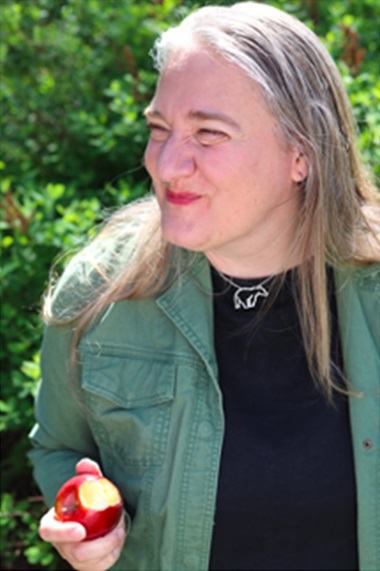
Karen Giesbrecht urges us to connect our food choices with our life values.
Over dinner with friends a few weeks ago, conversation got around to how we navigate through life-altering crossroads.
One friend shared advice that intrigued me about making decisions based on our values, not our circumstances. In difficult moments, certain decisions may seem like a good choice – or the only possible choice – but if we consider our deep values, we know which decisions will not lead to the life we want.
This framework for making decisions around our values instead of our circumstances also got me thinking and talking with friends about day-to-day decisions.
Most people I asked said they could not name core values. Instead, they gave me details about their personality, or voiced values more aspirational than what really impacted their daily life.
Several commented that while they could not articulate their values well, they know when they are living outside of their values, and do not like how that feels.
What we eat
When I steered these conversations towards what we eat, most people told me that they had not consciously connected their food choices with their life values. A few think about the people who grow our food when they decide on their grocery list.
One friend told me how relationships are a high value, which inspires her to make vegan dishes wherever her family gathers, as she has a brother who avoids all animal foods.
We tend to eat what is convenient, what we find tasty and, increasingly, what we can afford. It is not usually our values that impact what we purchase and consume.
Food values
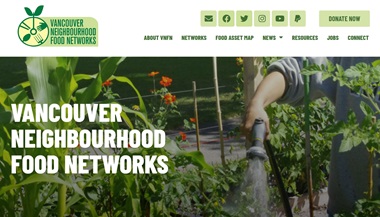 We are all guided by different perspectives, but there are a few values that we would benefit from embracing collectively.
We are all guided by different perspectives, but there are a few values that we would benefit from embracing collectively.
First, most people value health. We want to feel well physically, think clearly, have mostly positive emotions (with a handle on the harder ones) and be spiritually healthy. What we put in our bodies cannot prevent all illnesses and challenges, but it does make a difference to how we cope.
Food, at its simplest, is fuel + building blocks + pleasure. We should enjoy what we eat, but in deeply satisfying ways, not with mindless consumption of ultra-processed, hyperpalatable food. One definition of ultra-processed food is items with one or more ingredients not found in a typical home kitchen. Our bodies can handle some of these, but they should not be the majority of our intake.
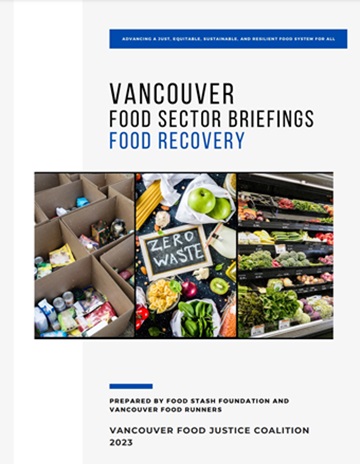 Another shared value is maintaining a viable planet. We may all be in different places in our creation care journey, but I trust we all want earth to support us, and the generations coming after us. I imagine most of us compost food scraps and recycle as much as we can.
Another shared value is maintaining a viable planet. We may all be in different places in our creation care journey, but I trust we all want earth to support us, and the generations coming after us. I imagine most of us compost food scraps and recycle as much as we can.
We try to not throw food away, though collectively, our society is wasteful. In Canada, it is estimated that more than half the food produced is lost or wasted, costing us more than 49 billion annually. To put this in perspective, we waste 2,600,000 potatoes, 650,000 loaves of bread, 1,000,000 cups of milk, and 470,000 eggs every day.
When we throw out food, we also waste the energy and resources used to process, package and transport those items. At the same time, one in five Canadians struggles to access enough nourishing food. Is there one way you could be more intentional about food purchasing, meal planning and learning about date labels this week?
Care for vulnerable
Beyond ourselves, we value the health of those we love, and we look out for our neighbours, colleagues and friends. If we value justice and equity, we also care for the most vulnerable people in our communities. Some of us have direct outreach roles, and some of us care for people who struggle with poverty in less direct, but still vital ways – giving money and other resources, administrative support or sitting on boards.
Whatever our role is, can we become more curious about how the poorest people in our city meet their basic needs, and how that aligns with our values? How often are ultra-processed snacks the main food at community programs? How often are truly nourishing and culturally familiar foods available?
Nan
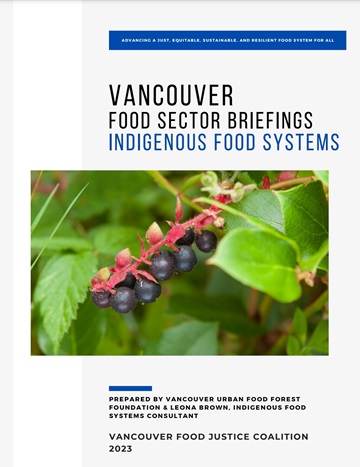 The hardest hour of my week was spent sitting next to a woman about my age who likes to be called Nan. I was tasked with helping her figure out what to eat for the next few days. Two days before our conversation, Nan’s right leg had been amputated because she lives with diabetes and she had not been able to control her blood glucose levels.
The hardest hour of my week was spent sitting next to a woman about my age who likes to be called Nan. I was tasked with helping her figure out what to eat for the next few days. Two days before our conversation, Nan’s right leg had been amputated because she lives with diabetes and she had not been able to control her blood glucose levels.
She would moan in pain when she shifted her body the wrong way, and it would take a few moments before she could focus on our conversation again. Nan had coped in the best way she could, living with poverty and mental health challenges, but now, even simple tasks will be difficult for her.
At the end of our conversation, I could walk away, but Nan’s situation continues to weigh on me. She has a difficult road ahead, and despite living in a beautiful city, rich in natural, cultural and human resources, Nan, and many like her, struggle to access what they need.
Nan’s income is well below $58,163, the Market Basket Measure (often referred to as the poverty line) for Vancouver. Losing her leg is not reversible, but was preventable. Food insecurity and homelessness are also preventable if we shift some of our collective values and resources. There are many good people working to address these challenges, but we still have work to do.
Stamina
We cannot articulate our core beliefs, particularly our food values and our neighbour values, without reflection. But then, when we know what we believe, we cannot unsee our values. Every decision we make leads us toward – or away from – the life, the body and the community we want.
Living in a value-driven way in our day-to-day decisions helps us have the stamina to live consistent with our values during harder moments, or when our values are seemingly in conflict. We participate in our food system daily – multiple times a day for those of us who are fortunate enough to live with a good income. How will your next meal reflect your values?
Resources
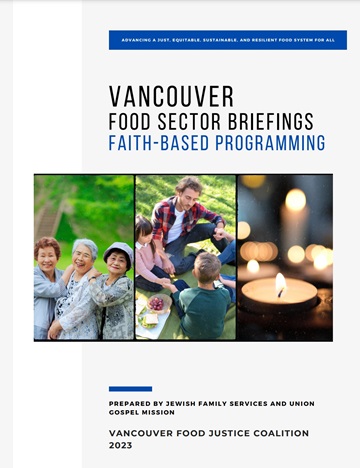 The Vancouver Neighbourhood Food Networks put together a series of food sector briefs to help our city council understand our food landscape.
The Vancouver Neighbourhood Food Networks put together a series of food sector briefs to help our city council understand our food landscape.
Read about:
Karen Giesbrecht is a registered dietitian with a particular interest in mental health, strong communities, good stories and real food. She wove all these together in Happy Colon, Happy Soul: An Exploration of Why and How we Share Food (Wipf & Stock, 2019).
At home in Vancouver, Karen takes great delight in sharing good meals with her family, friends and those in her community who know hunger.
She has written this comment as a member of The Bell: Diverse Christian Voices in Vancouver. Go here to see earlier comments in the series.
